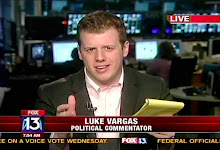
Mark McKinnon, a Republican strategist and communications manager to George W. Bush's '04 campaign, was interviewed on All Things Considered today (listen HERE). McKinnon is a senior advisor to John McCain's campaign now, and he summed up the Senator's campaign more accurately than anyone in the mainstream media:
"We believed people still liked and admired John McCain, they just thought he was no longer a viable candidate. The whole strategy was literally as simple as just saying, 'stay in the game,' and by that time people will have looked at the other candidates and realize that John McCain is really the best suited to be President, and say 'look at this, he's still here, surprise!' We thought it could break late and fast to John McCain and move wholesale, and that's what happened."
Last summer, the time period during which McCain was essentially counted out of the race and decided to stick around and stay on message, Governor Mitt Romney changed message and went (very) negative. McCain's has been a smart, positive, and productive campaign, and any Democrat should be worried about running against him.

On that note, I wanted to publish a portion of the interview the POV Magazine (of which I am the editor) conducted with Mark McKinnon just a few months ago. If McKinnon's right, John McCain's general election campaign will have the upper hand on a number of issues, but he also notes a number of strengths of an Obama campaign.
Enjoy:
Does 9/11 still work as a campaign issue, or is it getting stale?
I think it’s still relevant. In 2004 we actually were highly sensitive about 9/11. We talked a lot about whether we could even talk about it at all. But what we discovered was that voters really wanted us to talk about it. It’s the seminal event of our lifetimes. It’s something we all collectively went through and were scarred by. It’s a moment when our lives changed and our politics changed, our foreign policy changed. It is still, and I think will continue to be, an important reference point for political campaigns and political discussion.
Presidential campaigns are starting earlier than ever before, and candidates have long been advertising. How does this accelerated schedule strike you?
It seems strange to me. I know of very few instances where early advertising spending was a great return on investment. The important thing is to be there when voters are paying attention. Voters are interested in this election but they’re not that engaged yet. The problem is that because it’s so early, voters are going to get worn out pretty quickly. They are just going to tune this out until December.
What impact do you think YouTube and other non-traditional media will have on the campaign?
It’ll have a huge impact. We’re already calling it the YouTube election. Lots of things are happening. The role of the conventional 30-second broadcast TV ad is diminishing significantly. What it really means is that campaigns are losing control. The control of the messages is being completely democratized. We now have thousands of pajama producers out there creating ads and some of them are pretty good. Some of them are very good. The Obama ad about Clinton (using the Apple “1984” ad) was fabulous. It’s one of the better political ads I’ve ever seen. Technology is revolutionizing how we’re campaigning.
Right now and for the first time in a long time, Democrats are out-raising Republicans. Is this significant?
The party out of power always has more fundraising energy. When we were raising money for Bush in 1999 and Bill Clinton was in office, People were throwing money at us. People have been in the desert a long time and want water.
Generally speaking, what goes into a successful media campaign?
It’s the same as always. You have to use all the available tools to articulate and communicate a clear and compelling rationale for your candidacy. That’s how you win elections. It’s important to get the message right and to communicate it through the tools you have including broadcast media, YouTube, and everything else that’s out there.
Is Iraq going dominate the ’08 campaign or might another issue emerge?
It’s hard to imagine that Iraq won’t be the predominant issue. That’s not to say that other issue won’t emerge. Iraq will definitely be hanging over the election, although I suspect other issues will come forward that will be important. McCain is talking about the environment, so you have Republicans going green. It’s a testament to how powerful that issue is.
You said that George Bush attracted you in 1999 because he was for things rather than against things. In 2004, you made the anti-John Kerry windsurfing ads. How do you mix positive and negative messages in a campaign?
There’s a lot of mythology about negative advertising first of all. The reality is that voters want you to make the choice clear, and candidates should make it clear. They should not be shy about making a clear distinction between their record and vision and their opponents’ record and vision. I also think you can’t get elected president of the United States without having a vision for the future.
What’s kind of interesting, and we’ll see how it plays out, is that Obama’s language is similar to Bush’s in 1999. He’s saying the same things about the kind of campaign he intends to run. We kept that positive tone right up until New Hampshire when we got our asses kicked. Suddenly we realized that we had to fight for it. It’s hard to get through these contests without putting on the brass knuckles at some point. It’ll be a challenge for Obama…a real balancing act. It’s hard to pull off.
(all photos: © 2008 by Luke N. Vargas. All Rights Reserved.)




No comments:
Post a Comment